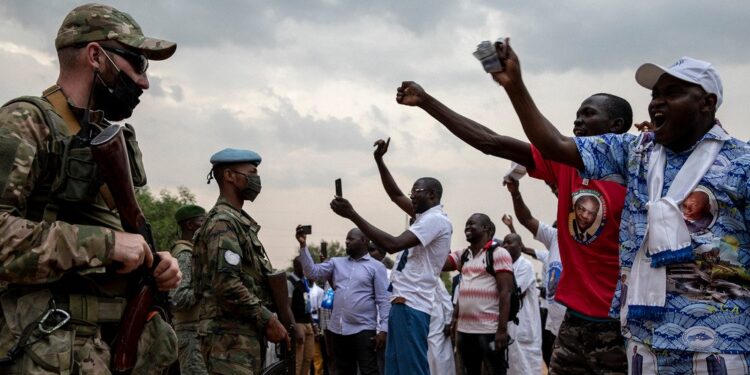The presence of Russian mercenaries in the Central Africa Republic has continued to stir up controversy, the latest of which is the United Nations’ investigation into claims that they were involved in the massacre of more than 30 people in early January, 2022.
Reports by UN officials who did not want to be identified say some of the civilians were killed by stray bullets during a January 16-17, 2022 operation near the town of Bria. The attack targeted the Union for Peace rebel group.
Violence has increased in the Central African Republic (CAR), with the UN Office for the Coordination of Humanitarian Affairs saying that from January to November 2021, there were 387 violent incidents against humanitarian workers.
UN spokesman Stéphane Dujarric said the organisation is investigating the January incident. He added that the Multidimensional Integrated Stabilisation Mission in the Central African Republic (MINUSCA) had received reports of the incident, which involved CAR troops and “other security personnel”.
“We are currently confirming the number of casualties and displacement,” Dujarric was quoted as saying. He added that MINUSCA had dispatched a human rights team accompanied by security personnel to the area.
The mandate of MINUSCA, which has been in the country for seven years, was extended until 15 November 2022.
The UN expressed concern in 2021 that many forces, including the Russian Wagner group, which is composed of private military and security personnel, were reported to have been committing systemic and grave human rights violations, including arbitrary detention, torture, disappearance, and summary execution in the CAR.
The MINUSCA Human Rights Division said it had gathered evidence indicating that the security personnel were involved in military training and actively participated in military operations, including arresting suspects, and inflicting inhumane treatment and torture on some of them. On a number of occasions and in different locations, they were also reportedly involved in extrajudicial killings.
“Russian mercenaries engage in human rights abuses of civilians, extract steep costs in payments and mineral concessions, and deprive local citizens of critically needed resources,” the US ambassador to the UN, Linda Thomas-Greenfield, said on October 26, 2021 as the UN renewed MINUSCA’s mandate.
Her deputy, Richard Mills, told military contractors to respect international humanitarian law and the rights of all Central Africans. “We call on both the Central African Republic and Russian governments to fully investigate abuses by Russian-supported actors and Central African soldiers and to hold those responsible accountable.”
The Russian mercenaries have been in the country since 2017. The CAR government hired the group to offer security after a meeting between President Faustin-Archange Touadéra and Russia’s Foreign minister, Sergey Viktorovich Lavrov .
Wagner provides maintenance services, and military equipment and training in the countries they are deployed, usually with the status of “instructors”. However, critics are sceptical of the group’s actions and speculate that they serve the Kremlin’s interests.
Moscow said there are 1,135 “unarmed instructors” in the CAR, supporting the beleaguered government of President Touadéra. It has further denied claims of using the group to control or further its interests in the West African country.
Pauline Bax, a senior editor and policy adviser at the International Crisis Group, said the mercenaries and other fighters have helped keep the current government in power.
“A lot of the fighters are not necessarily Russians. There is a Libyan contingent. There are Syrian fighters, people from Ukraine and Chechnya fighters as well. It’s hard to get any clear idea what exactly they do in the countryside, but they have been very successful in repelling rebels from most of the major towns. And this Wagner force together with the national army has managed to secure a lot of mining zones as well as major towns in the country which was unprecedented; this hasn’t happened in the Central African Republic in the last 20 years,” she explained.
However, reports of civilian abuses have overshadowed the successes of the Russian mercenary group and government forces. Tobias Wellner, a sub-Saharan Africa senior analyst with Dragonfly Intelligence, a group that works on global security and political risks, noted that governments that lack proper governance structure are likely to attract mercenary groups that are accountable to no one.
The Central African Republic has been ravaged by civil war over the years. Since gaining independence in 1960, the poverty-stricken CAR has experienced dictatorial rule, corruption, and severe political instability. Almost without exception, every ruler of the CAR since independence – David Dacko (1960-66), Jean-Bédel Bokassa (1966-1979), David Dacko (1979-1981), André Kolingba (1981-1993), Ange Félix Patassé (1993-2003), and François Bozizé (2003-2016) – either came to power or was ultimately overthrown in a military coup. In the last decade alone, the CAR has witnessed at least 10 military coup attempts and army mutinies, and an almost constant state of rebellion.
In the December 2015 – February 2016 presidential election, Touadéra was elected to the presidency in a second round of voting against former Prime Minister Anicet-Georges Dologuélé. He was re-elected for a second term on December 27, 2020 amid conflicts, which have continued. A peace deal he initialled with 14 armed groups, which control most of the chronically-troubled country, has largely failed to end the fighting.
On May 4, 2021, the CAR government established a special commission of inquiry to investigate violations of international humanitarian and international human rights law linked to the elections. However, human rights violations have been on the rise, especially those committed by the security forces and armed groups.
The government forces and the mercenaries are meant to protect civilians from attacks by armed groups, but according to UN investigators in a report released in June 2021, this has not been the case. The report highlighted human rights abuses and excessive force committed by the Russian mercenaries and government forces.







